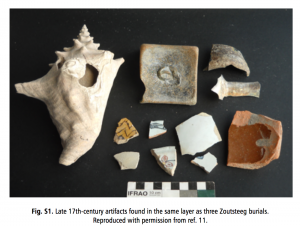APRIL 2015: PNAS Publication of Genome-wide ancestry of 17th-century enslaved Africans from the Caribbean

Genome-wide ancestry of 17th-century enslaved Africans from the Caribbean
Hannes Schroeder, María C. Ávila-Arcos, Anna-Sapfo Malaspinas, G. David Poznik, Marcela Sandoval-Velasco, Meredith L. Carpenter, José Víctor Moreno-Mayar, Martin Sikora, Philip L. F. Johnson, Morten Erik Allentoft, José Alfredo Samaniego, Jay B. Haviser, Michael W. Dee, Thomas W. Stafford, Jr., Antonio Salas, Ludovic Orlando, Eske Willerslev, Carlos D. Bustamante, M. Thomas P. Gilbert
In March 2015, EUROTAST research network members Hannes Schroeder, Marcela Sandoval-Velasco, Jay B. Haviser, Antonio Salas, Ludovic Orlando, and M. Thomas P. Gilbert published a landmark article in PNAS, the Proceedings of the National Academy of Sciences of the United States of America. This article identifies the African genetic ancestry of three enslaved individuals buried in the 17th century on the Caribbean island of Saint Martin. The geographic origin of these individuals was traced with surprising precision to locations in present-day northern Cameroon, Nigeria and Ghana. The ability to use genomic data as an alternative record has major implications for the history and archaeology of the Transatlantic Slave Trade, as documentary records are scarce, biased, or completely unavailable. The study also highlights the ability to obtain genomic data from poorly preserved archaeological remains in tropical settings.
Dr. Hannes Schroeder explains:
There are historical records – merchant ledgers, shipping records and the like – but they tend to refer to coastal shipping points rather than the slaves’ actual ethnic or geographic origins and this is where the DNA comes in. It can provide new insights where historical information is missing. To our knowledge this is the first time that genome-wide data have been used to identify the origins of enslaved Africans. And given the limited knowledge we have on the slaves’ origins this is obviously quite a breakthrough.
The importance of this research was widely noted, with stories appearing in Science, the Los Angeles Times, The New Historian, and the Daily Mail.
The original article:
Genome-wide ancestry of 17th-century enslaved Africans from the Caribbean

